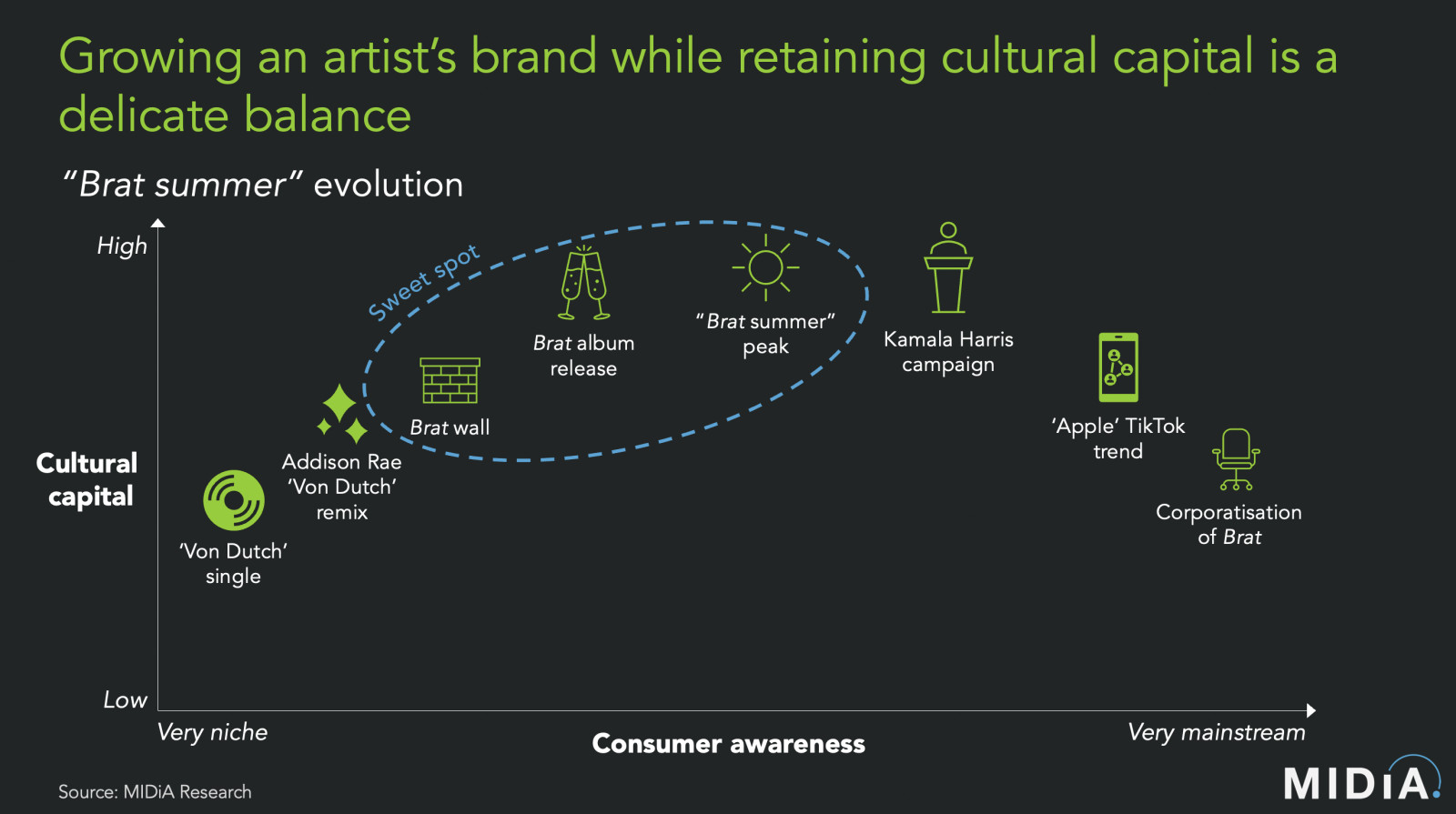‘Brat’ summer and the dilemmas of going mainstream

Photo: MIDiA Research

It has become a rule of thumb that the moment corporate America begins capitalising on a trend, that trend begins to die. Cultural fragmentation has helped niches and scenes flourish, but it has also left large corporations that depend on mainstream products hungry for relevance — and willing to do anything to tap into the zeitgeist, including wringing cultural moments dry. This has led to the cultural version of overharvesting, when a resource is stripped faster than it can regenerate. It happened with the Stanley tumbler, “very demure”, and many viral TikTok songs, and it was only a matter of time before it happened to Brat summer.
Sometime around the album’s official release in early June, Brat references started showing up in the signage at coffee shops and supermarkets, in the products of brands like Hydro Flask, Kate Spade, and ColourPop, announcements from the Metropolitan Transit Authority, and even in a job listing posted by Deutsche Bank. But it was after Charli XCX’s now-infamous “kamala IS brat” tweet on July 22 that things really began to spiral. The Harris campaign seized on the opportunity to attract young voters by painting itself Brat green, and suddenly, news anchors were struggling to decode the situation on CNN, every major news organisation had published a Brat explainer, and more and more brands were piling on the bandwagon. Days later, Pitchfork published an article titled “Brat Summer Is Dead, Long Live Brat Summer”, using the official Brat meme generator to render an album cover with the word “rip”.
No album campaign in recent memory has encapsulated the highs and lows of today’s music industry as perfectly as Brat. Charli XCX demonstrated how remaining on the fringes of internet culture and playing to a niche is a strength in today’s attention-strapped era. Having spent more than a decade cultivating a fanbase within her scene, her music has gone beyond sound to create an entire culture, with its own aesthetics, values, and even lingo (“so Julia”, “work it out on the remix”, “bumpin’ that”). In today’s oversaturated entertainment space, music desperately needs to break the fourth wall — and that means being about the culture, not just the song. The dilemma is that if an artist grows enough to break the fourth wall of culture, they then have to consider the risks of “going mainstream”: burning through that hard-earned cultural relevance quickly, which can exhaust and even alienate fans. Brat is no doubt a smash success for all involved, but this kind of meteoric rise and inevitable corporate bandwagoning comes with a catch. For many fans, being on the niche side is what made Charli XCX’s scene special in the first place.
Featured Report
MIDiA Research 2026 predictions Change is the constant
Welcome to the 11th edition of MIDiA’s annual predictions report. The world has changed a lot since our inaugural 2016 edition. The core predictions in that report (video will eat the world, messaging apps will accelerate) are now foundational layers of today’s digital economy.
Find out more…Maybe this assessment is unfair to the artist. Maybe Brat summer was only meant to last the season, and as the Harris campaign demonstrates, there also comes a point where artists lose control over how their work is referenced and interpreted. Moreover, because the current music business is not well-built for monetising niches — only masses, artists may feel forced to choose between striving for a long-term cult fanbase that is harder to monetise, or a short-term mainstream moment that is easier to. It is hard to blame creators for taking advantage of their moment, and not every outcome is negative. Brat is both critically-acclaimed and commercially successful, a moment of vindication for an artist who has always stuck to her guns when it comes to her art.
Even so, artists and their teams will increasingly need to strategise for these dilemmas and do what they can to remain in the sweet spot of awareness and cultural capital. For Charli XCX, that was sometime after the Brat wall debuted and before the Harris campaign takeover. Many companies still seem to view becoming (or joining) a trend as the ultimate success in today’s attention-strapped reality, but this comes at a cost, as trends are fleeting by definition. The biggest album of Charli XCX’s career put all of these dynamics on display for us, the good, the bad, and the ugly — very brat, indeed.

The discussion around this post has not yet got started, be the first to add an opinion.